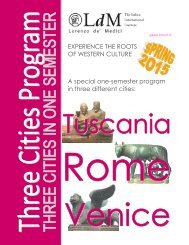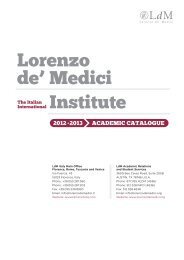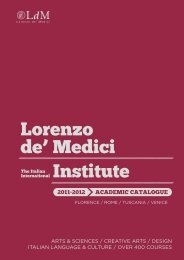aCademiC Catalog 2013-2014 - Lorenzo de Medici
aCademiC Catalog 2013-2014 - Lorenzo de Medici
aCademiC Catalog 2013-2014 - Lorenzo de Medici
Create successful ePaper yourself
Turn your PDF publications into a flip-book with our unique Google optimized e-Paper software.
School of Arts & Sciences ROME<br />
will focus on a small selection of his “Italian plays”, including<br />
“Romeo and Juliet” and “The Merchant of Venice”, in or<strong>de</strong>r to<br />
see how Shakespeare combined historical evi<strong>de</strong>nce and fiction,<br />
past and present, for dramatic effect and social commentary.<br />
Stu<strong>de</strong>nts will work with primary sources; for the same purpose<br />
they may also perform selected scenes. This course allows<br />
stu<strong>de</strong>nts to learn more about Shakespeare’s works and<br />
personality, and about relations between Elizabethan literary<br />
and theatrical culture and Renaissance Italy.<br />
Prerequisites: LIT 150 Survey of Western Literature, or<br />
equivalent<br />
Masters of Italian Cinema: Fellini<br />
MCT 303 R<br />
Cr: 3; Contact hrs: 45<br />
Italian cinema has been extremely influential in the <strong>de</strong>velopment<br />
of international cinema. Completely reinvented after the Second<br />
World War, the Italian “seventh art” has produced important<br />
directors who have combined an interest in national, social and<br />
political issues with a very strong personal style. The course,<br />
which focuses on a single master for the entire semester,<br />
engages stu<strong>de</strong>nts in close analysis of several films, pertinent<br />
film studies criticism, and a range of interdisciplinary issues.<br />
The master studied this term is one of the most acclaimed<br />
Italian directors, Fe<strong>de</strong>rico Fellini. Winner of multiple Oscars,<br />
including one for lifetime achievement, Fellini is a true<br />
iconoclast, for whom the adjective “Fellinesque” had to be<br />
invented. The course explores his innovative and bizarre style<br />
which magically blen<strong>de</strong>d reality and fantasy, broke common<br />
filmmaking co<strong>de</strong>s, changed cinema history, and continues to<br />
influence cinema. Stu<strong>de</strong>nts will analyze his major themes that<br />
address relationships, family, society, and religion, obtaining a<br />
unique and ironic perspective on Italian culture and society.<br />
Philosophy and Religious<br />
Studies<br />
Western Philosophy<br />
PHR 130 R<br />
Cr: 3; Contact hrs: 45<br />
This course presents major questions and thinkers of western<br />
philosophy. Key methods and terms of philosophical inquiry<br />
are explored. Provi<strong>de</strong>s a broad overview of major historical<br />
directions, systems and schools of philosophy in the western<br />
tradition from the pre-Socratics to the present. Discussion<br />
centers upon perennial themes such as the existence of God,<br />
the nature of knowledge, proof and reasoning, and ethics.<br />
Serves as the basis for further courses in philosophy.<br />
Introduction to Italian Philosophy<br />
PHR 185 R<br />
Cr: 3; Contact hrs: 45<br />
The course examines the evolution of the main schools of<br />
Italian philosophical thought beginning with the Middle Ages,<br />
covering the rich philosophical <strong>de</strong>bate in Renaissance Italy, and<br />
reaching the Counter Reformation and the 18th century Age of<br />
Reason. However, since the problems discussed by these Italian<br />
schools of thought emerged in ancient philosophy and are<br />
directly drawn from it, it is initially necessary to review the i<strong>de</strong>as<br />
of Greek and early Christian philosophies. Key thinkers inclu<strong>de</strong><br />
Plato and Aristotle, St. Augustine, St. Thomas Aquinas, Dante,<br />
Petrarch, Marsilio Ficino, Pico <strong>de</strong>lla Mirandola, Machiavelli,<br />
Giordano Bruno and Campanella. The course ends by looking<br />
at the revolutionary philosophical thought that marks the<br />
beginning of the Age of Science and Reason, embodied in Italy<br />
by Galileo Galilei.<br />
Lost Symbolisms: Secret Co<strong>de</strong>s in Western Art<br />
PHR 255 R; Dual listed: ART 255 R<br />
Cr: 3; Contact hrs: 45<br />
The course focuses on the links between artworks and<br />
astrology, alchemy, geometry, numerology, and selected<br />
philosophical themes in Western art between 1300 and 1800.<br />
Art has served various functional and aesthetic purposes<br />
in different cultures and periods. In some eras art has also<br />
embodied a symbolic language, mysterious to the majority<br />
but highly significant to the minority able to read or <strong>de</strong>co<strong>de</strong> it.<br />
For example, what we may call the secret messages of certain<br />
paintings and sculptures of past centuries can be interpreted in<br />
terms of astrology. A specific field of art history, iconography,<br />
studies subject matter, symbolism, and signification in works<br />
of art. Stu<strong>de</strong>nts use elements of this approach to examine the<br />
fascinating and complex range of meanings that some artworks<br />
were inten<strong>de</strong>d to transmit and which can still be recovered.<br />
Religion and Culture in Italy<br />
PHR 284 R<br />
Cr: 3; Contact hrs: 45<br />
This course examines the interaction between culture and<br />
religion in Italy, above all mo<strong>de</strong>rn Italy. The peninsula has been<br />
the almost uninterrupted home of the Catholic church and the<br />
Vatican State, a factor of great importance for centuries and<br />
still today in the <strong>de</strong>velopment of Italian culture and society. At<br />
the same time Italy is a relatively young nation, <strong>de</strong>mocratic,<br />
industrialized, and multicultural. In the lively Italian cultural<br />
landscape religion can mean oceanic crowds at sanctuaries or<br />
a papal appearance, fierce newspaper <strong>de</strong>bates, small parishes,<br />
and Muslims or Christians praying in rented spaces. Italy,<br />
in<strong>de</strong>ed, epitomizes key issues in religion and culture generally.<br />
Stu<strong>de</strong>nts move between themes of diversity in religious<br />
belief and practice, coexistence of communities, continuity of<br />
tradition and local heritage, the political interface, secularism,<br />
religion in the media and popular culture, national i<strong>de</strong>ntity,<br />
and educational, social and health policies and activities. The<br />
course exploits the special opportunity to investigate various<br />
religious communities in Rome.<br />
Empowerment<br />
PHR 310 R<br />
Cr: 3; Contact hrs: 45<br />
Empowerment is an internal strength that can be applied to<br />
all parts of a person’s life. The class is a cross-platform format<br />
that focuses on maximizing the individuality of each stu<strong>de</strong>nt<br />
within an inter<strong>de</strong>pen<strong>de</strong>nt network, and is based on the study<br />
of classical and mo<strong>de</strong>rn philosophy. Stu<strong>de</strong>nts learn to <strong>de</strong>al<br />
effectively and positively with those situations where they feel<br />
most disempowered. The ultimate objective of the course is<br />
to initiate the process of maximizing self-motivation, through<br />
purpose, passion, prosperity and peace.<br />
Political Science and<br />
International Studies<br />
Introduction to Political Science<br />
POL 150 R<br />
Cr: 3; Contact hrs: 45<br />
This course will introduce you to the formal study of politics. You<br />
will become familiar with the basic vocabulary of the discipline,<br />
learn about the different ways that political issues are studied<br />
and <strong>de</strong>velop critical reading and thinking. Furthermore, this<br />
course will <strong>de</strong>fine basic concepts such as politics, government,<br />
nation, state, types of political systems and <strong>de</strong>velopment of<br />
political institutions.<br />
Globalization and its Consequences<br />
POL 250 R<br />
Cr: 3; Contact hrs: 45<br />
“Globalization” has been a very popular term in recent years.<br />
Technological change, business strategies, cultural interactions<br />
and other aspects of human activity are occurring more and<br />
more on a planetary scale. The course aims at providing<br />
stu<strong>de</strong>nts with a basic un<strong>de</strong>rstanding of the complexity of the<br />
phenomenon, by taking a historical approach covering the<br />
entire 20th century, and then focusing on the most recent<br />
political, social and economic processes of the late 20th and<br />
early 21st centuries. The course starts by <strong>de</strong>fining the concept<br />
of globalization and then offers a brief but clear reconstruction<br />
of the trends towards globalization in previous phases of human<br />
history. It will then focus on specific questions: is economic<br />
globalization an inevitable phenomenon or, rather, a reversible<br />
one? Is economic globalization necessarily tied to western<br />
capitalism? Has globalization taken in the past, and could it take<br />
142<br />
LdM Aca<strong>de</strong>mic <strong>Catalog</strong> <strong>2013</strong>-<strong>2014</strong>





